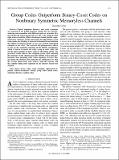Group Codes Outperform Binary-Coset Codes on Nonbinary Symmetric Memoryless Channels
Author(s)
Como, Giacomo
DownloadComo-2010-Group Codes Outperfo.pdf (412.9Kb)
PUBLISHER_POLICY
Publisher Policy
Article is made available in accordance with the publisher's policy and may be subject to US copyright law. Please refer to the publisher's site for terms of use.
Terms of use
Metadata
Show full item recordAbstract
Typical minimum distances and error exponents are analyzed on the 8-PSK Gaussian channel for two capacity-achieving code ensembles with different algebraic structure. It is proved that the typical group code over the cyclic group of order eight achieves both the Gilbert-Varshamov bound and the expurgated error exponent. On the other hand, the typical binary-coset codes (under any labeling) is shown to be bounded away both from the Gilbert-Varshamov bound (at any rate) and the expurgated exponent (at low rates). The reason for this phenomenon is shown to rely on the symmetry structure of the 8-PSK constellation, which is known to match the cyclic group of order eight, but not the direct product of three copies of the binary group. The presented results indicate that designing group codes matching the symmetry of the channel guarantees better typical-code performance than designing codes whose algebraic structure does not match the channel. This contrasts the well-known fact that the average binary-coset code achieves both the capacity and the random-coding error exponent of any discrete memoryless channel.
Date issued
2010-08Department
Massachusetts Institute of Technology. Laboratory for Information and Decision SystemsJournal
IEEE Transactions on Information Theory
Publisher
Institute of Electrical and Electronics Engineers
Citation
Como, G. “Group Codes Outperform Binary-Coset Codes on Nonbinary Symmetric Memoryless Channels.” Information Theory, IEEE Transactions on 56.9 (2010): 4321-4334.© 2010 IEEE.
Version: Final published version
ISSN
0018-9448